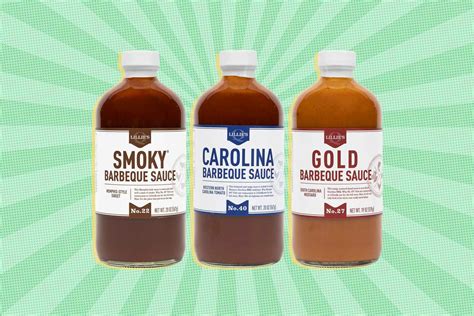
Three acclaimed pitmasters have declared Sweet Baby Ray’s as the best store-bought BBQ sauce, citing its balanced flavor and versatility. Despite the plethora of options available in supermarkets, these experts consistently reach for this readily accessible brand, underscoring its widespread appeal and reliability.
Three seasoned pitmasters, each renowned for their expertise in barbecue, have independently chosen Sweet Baby Ray’s as their preferred store-bought BBQ sauce. This consensus highlights the sauce’s consistent quality, accessibility, and balanced flavor profile, making it a staple for both professional and home cooks alike.
The Pitmaster Panel
The panel consisted of three highly respected figures in the barbecue world:
- Matt Horn: The owner and pitmaster of Horn Barbecue in Oakland, California, praised for his traditional techniques and commitment to quality ingredients.
- Pat Neely: A Memphis barbecue legend, known for his family’s famous Neely’s Bar-B-Que restaurants and his approachable cooking style.
- Carey Bringle: The founder of Peg Leg Porker in Nashville, Tennessee, celebrated for his innovative approach to Southern barbecue and his dedication to whole-hog cooking.
These pitmasters, with their diverse backgrounds and culinary styles, converging on a single choice speaks volumes about the universal appeal of Sweet Baby Ray’s.
Why Sweet Baby Ray’s?
Each pitmaster offered unique insights into why they favored Sweet Baby Ray’s over other commercially available options.
-
Matt Horn stated, “It’s the most balanced sauce out there… It’s not too sweet, not too tangy, and has a good spice level.” This balance is crucial for a sauce that can complement a variety of meats and dishes without overpowering their natural flavors. Horn’s preference for balance highlights the importance of a versatile sauce in a professional kitchen. He emphasizes that a good BBQ sauce should enhance, not mask, the taste of the meat.
-
Pat Neely echoed this sentiment, noting, “It’s a crowd-pleaser. Everyone loves it.” Neely’s emphasis on broad appeal underscores the sauce’s success in catering to a wide range of palates. As someone with decades of experience in the barbecue industry, Neely understands the importance of offering a product that resonates with a diverse customer base. His endorsement reflects the sauce’s ability to deliver consistent satisfaction, making it a reliable choice for both home cooks and restaurant owners. Neely adds, “It’s readily available and reasonably priced, making it a go-to for quick family meals.” This practicality further cements Sweet Baby Ray’s position as a pantry staple.
-
Carey Bringle highlighted its adaptability, explaining, “It’s a great base for making your own custom sauces.” Bringle’s perspective emphasizes the sauce’s potential as a foundation for culinary creativity. As a pitmaster known for his innovative approach, Bringle values the ability to modify and personalize flavors. Using Sweet Baby Ray’s as a starting point allows chefs to build upon its existing profile, adding their own unique twists and ingredients to create signature sauces. He suggests adding ingredients like “vinegar, hot sauce, or spices” to tailor the sauce to specific tastes. This flexibility makes it a valuable tool for both professional chefs and home cooks looking to experiment with flavors.
The Appeal of a Balanced Flavor Profile
The consensus among the pitmasters points to the importance of a balanced flavor profile in a BBQ sauce. Too much sweetness can be cloying, while excessive tanginess can be overpowering. A good BBQ sauce should strike a harmonious balance between sweet, tangy, and spicy notes, complementing the flavor of the meat without dominating it.
Sweet Baby Ray’s is often praised for achieving this balance. Its sweetness is tempered by a subtle tanginess and a hint of spice, creating a complex and well-rounded flavor that appeals to a wide range of palates. This balance makes it a versatile sauce that can be used on a variety of meats, from ribs and chicken to pork and beef.
Accessibility and Affordability
Another key factor contributing to the popularity of Sweet Baby Ray’s is its accessibility and affordability. Unlike some artisanal or small-batch BBQ sauces, Sweet Baby Ray’s is readily available in most supermarkets and grocery stores across the country. Its widespread availability makes it a convenient option for both professional chefs and home cooks who need a reliable sauce on hand.
Furthermore, Sweet Baby Ray’s is relatively inexpensive compared to many other BBQ sauces. This affordability makes it an attractive option for budget-conscious consumers who don’t want to sacrifice quality or flavor. The combination of accessibility and affordability has contributed to the sauce’s widespread popularity and has made it a staple in many households.
Beyond the Bottle: Customization and Creativity
While Sweet Baby Ray’s is perfectly enjoyable straight from the bottle, many cooks appreciate its potential as a base for customization. As Carey Bringle noted, the sauce can be easily modified to create unique and personalized flavor profiles.
Some popular ways to customize Sweet Baby Ray’s include:
- Adding vinegar: A splash of apple cider vinegar or white vinegar can add a tangy kick to the sauce.
- Incorporating hot sauce: A few dashes of your favorite hot sauce can introduce heat and complexity.
- Mixing in spices: Ground spices like chili powder, cumin, or smoked paprika can enhance the sauce’s depth of flavor.
- Adding liquid smoke: A few drops of liquid smoke can impart a smoky aroma and flavor.
- Blending in fruit purees: Pureed fruits like peaches or raspberries can add sweetness and a subtle fruity note.
By experimenting with different ingredients and flavor combinations, cooks can create custom BBQ sauces that perfectly complement their favorite meats and dishes. This versatility is one of the reasons why Sweet Baby Ray’s has remained a popular choice for so many years.
The Evolution of BBQ Sauce
The history of BBQ sauce is as rich and complex as its flavor. Barbecue itself is believed to have originated in the Caribbean, with the word “barbacoa” referring to a method of slow-cooking meat over an open fire. As barbecue spread throughout the American South, each region developed its own unique style and flavor profile.
Early BBQ sauces were typically simple mixtures of vinegar, salt, and pepper. Over time, cooks began adding other ingredients like sugar, molasses, and spices to create more complex and flavorful sauces.
Different regions of the United States are known for their distinct BBQ sauce styles:
- Kansas City: Known for its thick, sweet, and tomato-based sauces. Sweet Baby Ray’s aligns with this style.
- Memphis: Famous for its dry-rubbed ribs and vinegar-based sauces.
- Texas: Renowned for its beef brisket and savory, peppery sauces.
- North Carolina: Divided into two main styles: Eastern North Carolina, which favors a thin, vinegar-based sauce with red pepper flakes, and Western North Carolina (Lexington style), which adds a touch of tomato paste or ketchup to the vinegar base.
- South Carolina: Characterized by its mustard-based sauces.
The evolution of BBQ sauce reflects the diverse culinary traditions of the American South and the ongoing quest for the perfect flavor combination.
Sweet Baby Ray’s: A Modern Classic
Sweet Baby Ray’s emerged in the 1980s and quickly gained popularity due to its balanced flavor profile and widespread availability. Its sweet and tangy taste, combined with its relatively low price point, made it a hit with consumers across the country.
The brand’s success can be attributed to several factors:
- Consistent Quality: Sweet Baby Ray’s has maintained a consistent level of quality over the years, ensuring that consumers can rely on its flavor and texture.
- Effective Marketing: The brand has invested in effective marketing campaigns that have helped to build brand awareness and loyalty.
- Versatility: The sauce’s balanced flavor profile makes it suitable for a wide range of meats and dishes, appealing to a broad audience.
- Accessibility: Sweet Baby Ray’s is readily available in most supermarkets and grocery stores, making it a convenient option for consumers.
Today, Sweet Baby Ray’s is one of the best-selling BBQ sauces in the United States, a testament to its enduring appeal and consistent quality.
The Debate Over Store-Bought vs. Homemade
The question of whether to use store-bought or homemade BBQ sauce is a matter of personal preference. Some cooks prefer the convenience and consistency of store-bought sauces, while others enjoy the creativity and control that comes with making their own.
There are advantages and disadvantages to both options:
Store-Bought BBQ Sauce:
- Advantages:
- Convenient and readily available.
- Consistent flavor and texture.
- Relatively inexpensive.
- Disadvantages:
- May contain preservatives and artificial ingredients.
- Limited control over flavor profile.
- Can lack the depth and complexity of homemade sauces.
Homemade BBQ Sauce:
- Advantages:
- Control over ingredients and flavor profile.
- Can be tailored to specific tastes.
- Often fresher and more flavorful than store-bought sauces.
- Disadvantages:
- Requires time and effort to prepare.
- Can be more expensive than store-bought sauces.
- May not be as consistent in flavor and texture.
Ultimately, the best choice depends on your individual needs and preferences. If you’re short on time or looking for a convenient and affordable option, store-bought BBQ sauce is a great choice. If you enjoy cooking and experimenting with flavors, making your own BBQ sauce can be a rewarding experience.
The Pitmasters’ Perspective on Homemade Sauce
While the pitmasters in the article endorsed Sweet Baby Ray’s as their favorite store-bought option, they also acknowledged the value of homemade BBQ sauce. They emphasized that homemade sauces can offer a unique and personalized flavor experience that is difficult to replicate with commercially available products.
However, they also recognized the practicality of using store-bought sauces in certain situations. For busy restaurant owners or home cooks who don’t have the time or resources to make their own sauce, a high-quality store-bought option like Sweet Baby Ray’s can be a reliable and convenient alternative.
The Future of BBQ Sauce
The BBQ sauce industry continues to evolve, with new flavors and products emerging all the time. Consumers are increasingly interested in exploring different regional styles and experimenting with unique flavor combinations.
Some of the trends shaping the future of BBQ sauce include:
- Emphasis on Natural Ingredients: Consumers are increasingly seeking out BBQ sauces made with natural and organic ingredients.
- Regional Specialization: More and more brands are focusing on specific regional styles of BBQ sauce, catering to niche markets.
- Global Flavors: Some brands are incorporating global flavors and ingredients into their BBQ sauces, creating innovative and exciting new products.
- Low-Sugar and Sugar-Free Options: With growing concerns about sugar consumption, there is increasing demand for low-sugar and sugar-free BBQ sauces.
- Spicy and Fiery Flavors: Spicy BBQ sauces continue to be popular, with brands pushing the boundaries of heat and flavor.
As the BBQ sauce industry continues to evolve, consumers can expect to see even more innovative and exciting products in the years to come.
The Enduring Appeal of BBQ
Barbecue has long been a beloved culinary tradition in the United States, and its popularity shows no signs of waning. From backyard barbecues to professional competitions, people of all ages and backgrounds enjoy the smoky, savory flavors of barbecued meats.
Barbecue is more than just a way of cooking food; it’s a social and cultural phenomenon. It’s a way to bring people together, celebrate community, and share delicious food. The shared experience of gathering around a barbecue pit, enjoying the aroma of smoking meat, and savoring the flavors of BBQ sauce is a uniquely American tradition.
The enduring appeal of barbecue lies in its simplicity and authenticity. It’s a way of cooking that has been passed down through generations, and it’s a way of connecting with the past. Whether you’re a seasoned pitmaster or a backyard enthusiast, barbecue offers a rewarding and satisfying culinary experience. The fact that even expert pitmasters turn to a store-bought staple like Sweet Baby Ray’s underscores the accessibility and universal appeal of barbecue as a culinary tradition.
FAQ Section
1. Why did the pitmasters choose Sweet Baby Ray’s as their favorite store-bought BBQ sauce?
The pitmasters cited Sweet Baby Ray’s balanced flavor profile, versatility, accessibility, and affordability as key reasons for their preference. Matt Horn praised its balance of sweetness, tanginess, and spice, while Pat Neely emphasized its broad appeal and convenience. Carey Bringle highlighted its adaptability as a base for custom sauces.
2. Can Sweet Baby Ray’s be used for different types of meat?
Yes, Sweet Baby Ray’s is a versatile sauce that can be used on a variety of meats, including ribs, chicken, pork, and beef. Its balanced flavor profile complements a wide range of dishes without overpowering their natural flavors.
3. Is Sweet Baby Ray’s a healthier option compared to other BBQ sauces?
Sweet Baby Ray’s, like most commercially produced BBQ sauces, contains sugar and sodium. While it’s not necessarily a “healthy” food, it can be enjoyed in moderation as part of a balanced diet. Consumers concerned about sugar intake may want to explore low-sugar or sugar-free alternatives.
4. How can I customize Sweet Baby Ray’s to create my own unique BBQ sauce?
You can customize Sweet Baby Ray’s by adding ingredients like vinegar, hot sauce, spices, liquid smoke, or fruit purees. Experimenting with different flavor combinations can help you create a custom BBQ sauce that perfectly complements your favorite meats and dishes.
5. What is the history of Sweet Baby Ray’s BBQ sauce?
Sweet Baby Ray’s was created in the 1980s by Dave Raymond, who named the sauce after his younger brother, Larry, whose nickname was “Sweet Baby Ray.” The sauce quickly gained popularity due to its balanced flavor profile and widespread availability. It has since become one of the best-selling BBQ sauces in the United States.
6. What are the different regional styles of BBQ sauce in the United States?
The United States has several distinct regional BBQ sauce styles, including:
- Kansas City: Thick, sweet, and tomato-based.
- Memphis: Dry-rubbed ribs and vinegar-based sauces.
- Texas: Savory, peppery sauces for beef brisket.
- North Carolina: Thin, vinegar-based sauces (Eastern) or vinegar-based with a touch of tomato (Western/Lexington).
- South Carolina: Mustard-based sauces.
7. What are the advantages and disadvantages of using store-bought vs. homemade BBQ sauce?
Store-bought BBQ sauce is convenient, consistent, and relatively inexpensive, but may contain preservatives and artificial ingredients. Homemade BBQ sauce allows for control over ingredients and flavor profile and can be tailored to specific tastes, but requires time and effort to prepare and may not be as consistent.
8. How does Sweet Baby Ray’s compare to other popular store-bought BBQ sauces?
Sweet Baby Ray’s is known for its balanced flavor profile, which distinguishes it from some other store-bought sauces that may be overly sweet or tangy. Its widespread availability and affordability also contribute to its popularity.
9. What is the best way to store Sweet Baby Ray’s BBQ sauce?
Once opened, Sweet Baby Ray’s BBQ sauce should be stored in the refrigerator to maintain its quality and freshness.
10. Are there any allergen concerns with Sweet Baby Ray’s BBQ sauce?
Consumers with allergies should always check the ingredient list on the bottle. While formulations can change, Sweet Baby Ray’s typically contains soy. Check the label for any potential allergens.









